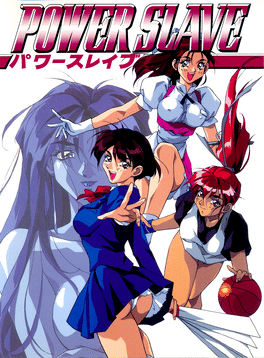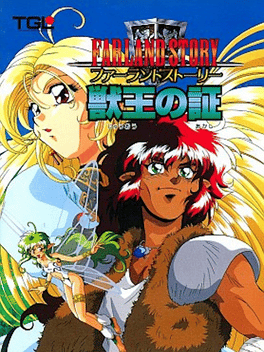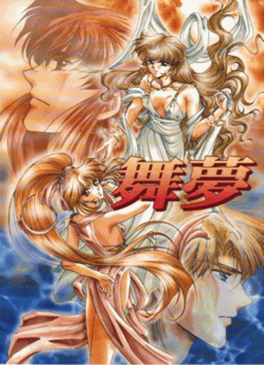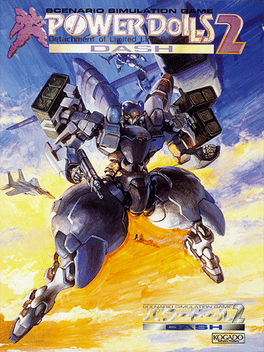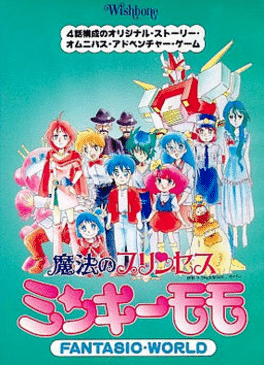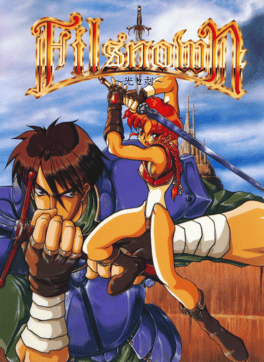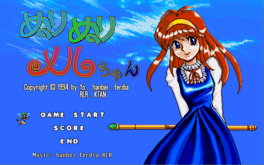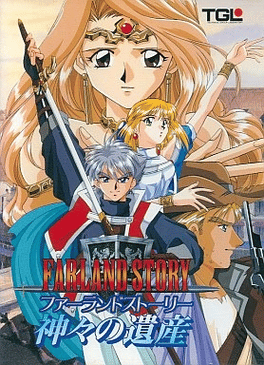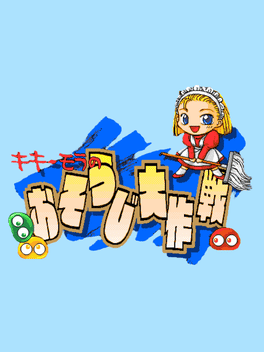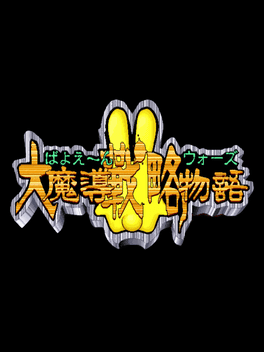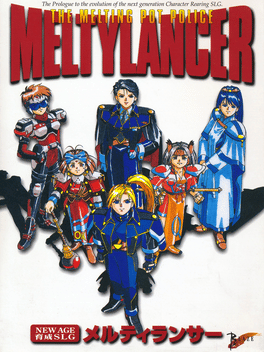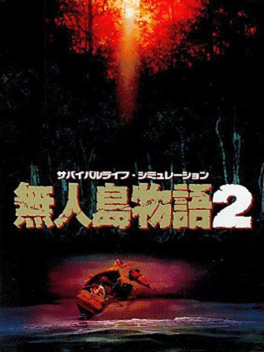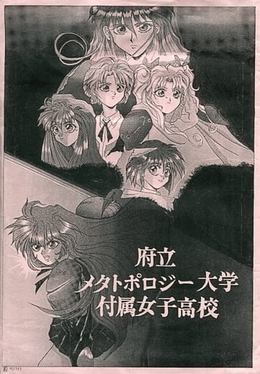New Pc 9800 Series Games - Page 4
-
Xediss
1995
-
Power Slave
1995
Power Slave
1995
Tetsuya is a rather ordinary Japanese teenager, who prefers hanging out with his sweetheart Rika than going to school. His passion are 3D video games. The newest game machine which allows the player to completely submerge into the virtual world, modeled according to his desires, has captured his heart. But one thing is strange: lately, Tetsuya keeps seeing himself as a killer and rapist. Dreams begin to haunt him. Is this just a side-effect of the game, or does he have a dark side he knows nothing about? Or maybe the game took him to another world, which will from now on become part of his life?.. -
Gensei Kaito Den
1995
Gensei Kaito Den
1995
Gensei Kaitō Den is set in the same world as Gensei Kitan. Important characters from Gensei Kitan (including its protagonist, the dog Smash) appear in the game, and some of them are playable. However, the main hero is a young and very ambitious thief named Ali-Baba - who is, naturally, the leader of a band of 40 robbers. The game is divided into chapters; each one describes an episode from Ali-Baba's "career", from train robbery to treasure hunt and even discovery of the magic lamp . The game is a humorous "light" Japanese-style RPG - there is no world map, and most of the time the hero is taken to a new location automatically. Many locations have simple puzzles to solve, and some dungeon areas are maze-like. The gameplay system is nearly identical to that of Gensei Kitan, with the same interface and overall structure. Random enemies are fought in turn-based style, on a side-view battle screen. Characters use physical attacks, special techniques, and magical spells. As in all Gensei games, HP, SP, and MP are full -
Mime
1995
Mime
1995
Once upon a time, there was harmony and balance in the world. Four kingdoms of humans have watched over the four elements. But then a traitor appeared, who has angered the Goddess with his selfish deeds. The balance was destroyed, the elements were no more in harmony, and the world plunged into chaos... Twelve thousand years later, a young knight named Eagle Windeed has been having a strange dream. Maybe there is still salvation for the human race. Maybe it is still possible to make peace with the higher beings. Eagle arrives at a tavern near the Tree Dungeon, determined to find out what his dream meant... Mime is a dungeon crawler: the entire game is set in a maze-like dungeon environments (with auto-map). There are no "safe" areas; random enemies can pop out anywhere (the random encounter rate is however quite low). Eagle starts alone, but later in the game three other heroes join him. The battles are turn-based, utilizing the standard "attack/magic" formula. There are a few explicit sex scenes in the game. -
Vanishing Point: Tenshi no Kieta Machi
1995
Kusanagi is a high school student. Recently, girls started to disappear from the area he lives. A friend of his sister requests to search for one such person. -
Power Dolls 2 Dash
1995
-
Mahou no Princess Minky Momo Fantastic World
1995
Mahou no Princess Minky Momo Fantastic World is based on an anime of the same name. The game is a Japanese-style adventure with a very simple gameplay, making it similar to a visual novel. The player's input is restricted to selecting locations, which automatically advances the story. The game is divided into four chapters, which can be played in any order. -
Filsnown: Hikari to Toki
1995
Long time ago, seven gods who were guarding the Earth defeated the evil god Gadim. But time has passed, and the seven benevolent gods have vanished one by one. Evil has awaken from its slumber. It's time for somebody else - a human - to become a hero and to defeat it once and for all. This chosen one is a young girl named Thiria Fray. She must find other girls with supernatural powers to aid her on her quest to defeat the evil. Filsnown plays like a standard top-down Japanese RPG: the party of heroines roams the world map, descend into dungeons, fight random enemies in first-person perspective combat using regular attacks or magic, and visit towns and villages to buy supplies and to rest. It contains cut-scenes with nudity and explicit sexual situations. -
Painting Mel-chan
1995
Painting Mel-chan
1995
One day, the Jewel of Time was suddenly stolen by someone, threatening an end to time itself. Cottonland is in big trouble, and now Mel and her black cat Zaza must retrieve the jewel's shards to make things right. Painting Mel-chan is a maze chase game in the vein of Pac-Man, Crush Roller, and other Golden Age arcade classics. You must move over each entire stage to paint it completely, all while avoiding or magically removing enemies. The game features several boss and bonus stages, plus a shop accessible between stages for replenishing your health-bar and obtaining power-ups. -
Mahjong Sword: Princess Quest
1995
Mahjong Sword: Princess Quest is a video game published in 1995 on PC-98 by Naxat Soft. It's a strategy game, with adult, anime / manga, cards and fantasy themes. -
Farland Story: Kamigami no Isan
1995
The sixth in the row on Farland Story games, "Kamigami no Isen" is set in a different world than the rest: a retro-style, Western-like environment with elements of sci-fi. You control a thief named Grey, who one day gets caught "in flagrante", and is saved by a girl named Elicia. It seems that Elicia and her sister have to escape the house, persecuted by enemies. Grey decides to help the sister, and gets involved in a conspiracy he would never dream about. Despite having a totally different story and setting, this Farland Story game still looks and plays more or less exactly the same as its predecessors. You have a party which you navigate on the screen in turn-based mode, assigning commands to it (such as "Move", "Heal", etc.) Some characters have special commands (like "Sneak" for Grey). Whenever you and the enemy attack each other, a short animated attack sequence is shown. You can use various types of terrain to your advantage (different for each character type). As in previous Farland Story games, you gain ex -
Horny Sweeper 2
1995
Horny Sweeper 2
1995
The sequel to Kōshoku Shikakenin (the first Horny Sweeper) tells us what happened to the brave hero Kazuya after he has overthrown the evil regime in the first game. One day Kazuya goes outside, enjoying the good weather, when an unknown girl appears and says she is the sister of Mai, one of the heroines of the first game. It looks like PSYCO, the evil brain-washing power, is back! And not just anywhere, but in a girls high school! Kazuya readily agrees to liberate the poor girls from the curse of PSYCO. Horny Sweeper 2: Joshikō Kiki Ippatsu plays very similarly to the first game. It is a top-down turn-based strategy game in which the player navigates Kazuya and the liberated girls on the large battle fields and attacks when enemies are in range. The difference is that in the sequel, characters gain experience points from each attack, rather than automatically leveling up after large battles, which grants this game a definite role-playing angle. There are more girls (including old acquaintances from the first ga -
Kikimora's Clean-Up
1995
Kikimora's Clean-Up
1995
Released in Vol 7, Kikimora's Clean-Up puts players in the role of Kikimora, who must completely sweep floors while facing a time limit. This game is similar to Pac-Man in nature. -
Bayoen Wars: Daimadou Senryaku Monogatari
1995
Released in Vol 5, Daimadou Senryaku Monogatari is a turn-based strategy game. -
Kamikuishiki-mura Monogatari
1995
Kamikuishiki-mura Monogatari is a satirical Japanese doujin resource management strategy game developed by HappySoft and published by Aum Soft. Game satirises the Aum Shinrikyo cult and the 1995 Tokyo subway sarin gas attack orchestrated by the cult. A common misconception is that the game was produced by the cult as propaganda, whereas Kamikuishiki-mura Monogatari actually portrays Aum and the sarin gas attack negatively, mocking its members and showing footage of 'humiliating' media coverage. -
Meltylancer: The Melting Pot Police
1995
MeltyLancer is a life simulation game similar to -- and by the same designers as -- Graduation, in which the player is tasked with training a squad of six young Tokyo Eastern Metro Police recruits, called Lancers. The main core of the game is determining each Lancer's weekly schedule: which days are they on patrol, which days on standby, and which days do they have off? After the general schedule is determined, the player meets with each Lancer to speak with them directly, determining specific actions they'll take that week; whether they spend a day training, exercising, or getting some much-needed rest will affect their stats and ability to complete missions. While on patrol or on special missions, battles may occur, which can be partially controlled with a handful of commands but mostly play out automatically. Each of the six Lancers has their own abilities, personalities, and specialties. A mini-CD containing the game's theme song is also included in the package. -
Mujintou Monogatari 2
1995
Mujintou Monogatari 2 is a follow-up to Mujintou Monogatari. Like its predecessor, it simulates survival of a group of people on a deserted island - this time, following a ship accident. The basic gameplay is very similar to that of the previous game. The player has to make schedules for the survivors, sending teams to procure necessary supplies such as water, food, light sources, building materials, etc. Only a small part of the island is accessible in the beginning: the player gradually explores it by arranging expeditions. It is possible to manage up to three parties of people, giving each an assignment, which unfolds automatically as the player chooses to complete a day. The survivors' attributes will change depending on the activities chosen by the player. The game is significantly more story-driven than the first installment. Each of the survivors has his or her own personality, attributes, and unique dialogue lines. Team members will comment on the occurrences, depending on the party formation the player ch -
Revival Xanadu
1995
Revival Xanadu
1995
Revival Xanadu is a remake of Xanadu: Dragon Slayer II. The remake distinguishes itself with the more detailed, graphically more advanced character portraits and backgrounds in the various places of interest (inns, temples, shops, etc.). Player and enemy sprites are also drawn in a noticeably more detailed way and have a higher resolution. However, the side-scrolling exploration environments retain the original look, with "retro" graphics reminiscent of the older original game. For the most part, the location layout in this remake are the same as in the original version, and the gameplay remains largely unchanged as well. -
Furitsu Metatopology Daigaku Fuzoku Joshi Koukou
1995
Fumejo is a doujin SRPG where the protagonist belongs to a club at the prestigious prefectural metapology educational institutionwith a 1200-year tradition. Together with allies, they navigate chaotic battlefields involving firearms, swordsmanship, and magic, aiming to rebuild their club crushed by conspiracy. Known for its setting where girls engage in deadly battles, high playability, and well-crafted background music. Characters gain experience points through combat to acquire new skills. The game employs a multi-scenario system where outcomes vary based on strategic decisions and choices made during battles. Although criticized for modest production values, an abrupt mid-story ending, and a simplistic growth system resembling a prototype version, it featured diverse elements typical of doujinshi, such as variations in character dialogue and designs, and occasional single-image cut-ins. Notably, the game manual was integrated within the game rather than being a separate paper format. A commercialized version re

